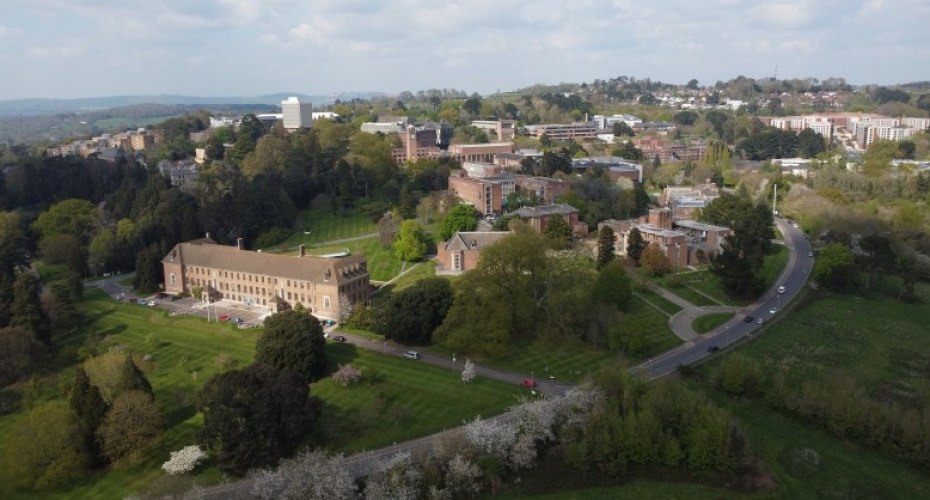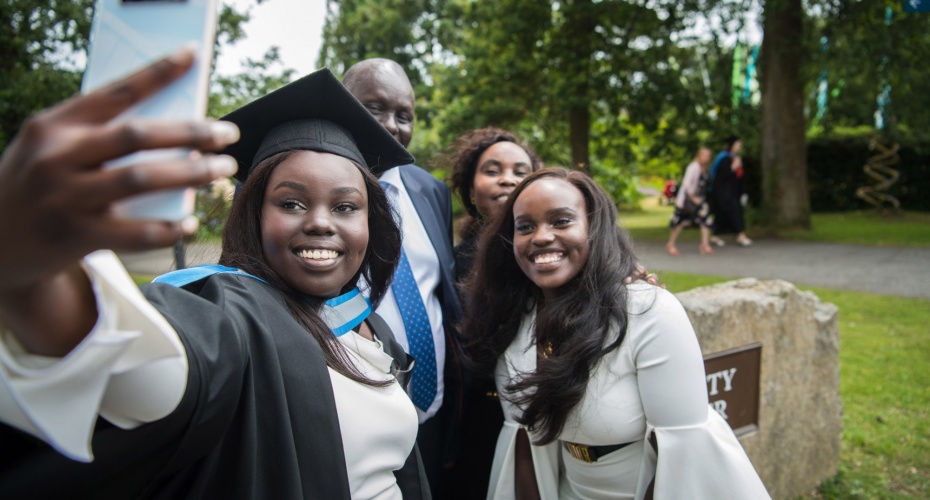
We offer family-friendly and flexible working policies, with 41 days annual leave and a pension salary exchange scheme. You can also make use of discount travel schemes, learning and development, and wellbeing services.

With its stunning beaches, sprawling countryside, outstanding quality of life, and increasingly excellent economic prospects, the South West has a great reputation as one of the very best places to live, work, and study in the UK.
Join the team
Welcome
Thank you for your interest in joining our Global Advancement team.
We are offering you an opportunity to make a real difference in your professional career as we strengthen and expand the University of Exeter’s engagement with supporters around the world.
Our work has helped fund vital research into diseases such as dementia, diabetes and cancer; into environmental problems like climate change, plastic pollution and food security; and into understanding important economic, social and political dynamics across the world.
Money raised has also supported students to attend Exeter and to have the best possible experience during their time here. It has funded bursaries and scholarships so talented students can come irrespective of their financial background, and it has paid for sports facilities and student events.
Our alumni and supporters also give their time generously in support of the University’s objectives, benefiting teaching and research.
We are now in the planning phase of our next philanthropic campaign, to raise £150m and 150,000 volunteering hours.
If you have a track record of success in philanthropy, and can inspire others in this area, then come join us and deploy your skills to have a real and lasting impact on the world around us.
Dr Shaun Curtis
Director of Advancement, University of Exeter

What we do
Global Advancement is responsible for building long-term relationships with the University’s supporters around the world. We're in touch with more than 155,000 alumni in 183 countries across the world. Exeter graduates have been making a positive difference to the lives of others for over 100 years.
The Global Advancement team is organised into three interrelated areas:
Philanthropy: responsible for relationships with high-net-worth individuals and organisations. They regularly meet one-to-one with current and potential donors to discuss areas of interest and update on the progress of a philanthropically funded project. As well as meetings this activity can take the form of online and physical events where donors can meet with academics and learn more about areas of interest. The Philanthropy team is also responsible for all bid submissions to Trusts and Foundations.
Supporter Engagement: responsible for building engagement with our alumni community and working with them to support different objectives across the university. The team manage relationships with alumni volunteers, who give their time to support careers activities, student recruitment and also peer-to-peer networking. The team runs alumni networks and groups organise larger scale events and are responsible for all mass communication and the Regular Giving programme.
Operations: responsible for supporting and informing the wider directorate by providing prospect research, data management, philanthropic income management, data systems management, insight, donor relations and planning and strategy development support. The work of the Operations team underpins the success of the wider Global Advancement team.
Working here
The work of the Global Advancement team is wide ranging. You could be working with our leading academics to help build support for critical research, you could be working with alumni volunteers to support student employability activity, or you could be organising alumni social and professional networking events. Plus much, much more.
Hear from a few members of the team below about what it's like to work here.
Philanthropic priorities
Our new university structure aligns around three core themes: healthier, greener, fairer. From September 2022 we will have three new faculties championing each:
Faculty of Health and Life Sciences (HLS)
The health, wellbeing and life sciences agenda continues to grow rapidly in regional, national and global importance. Research, education, philanthropic and commercial funding are all increasingly directed to this field and we must clearly signal our intention to address the challenges and opportunities this presents. We are strong across public health, physical health and mental health agendas and can build a distinctive profile for integrating health, wellbeing and the broader life sciences.
“The last campaign raised £28.4m for medicine and allied subjects, supporting our work into chronic illnesses such as cancer, diabetes and dementia. The generosity of our supporters is saving lives and improving care today. We can do so much more together, and our future development plans will take us to a new level.” Professor Sallie Lamb, Pro-Vice-Chancellor and Executive Dean
Faculty of Environment, Science and Economy (ESE)
The creation of sustainable futures is a key pillar of Strategy 2030, arising from our institutional strength in environment and sustainability research and education, and a recognition that this is now a regional, national and global priority. We are one of the world’s best universities in environment and sustainability-driven science, engineering and business, founded on strong fundamental disciplinary research and education. We excel in areas allied to environment and sustainability both within and between disciplines.
“Exeter hosts some of the world’s top environmental scientists, with their work supported by philanthropists from across the world. This has facilitated incredible developments in areas such as marine conservation, sustainable land management, sustainable finance, renewable energy and climate change mitigation. Philanthropic donations are vital for helping us lead the charge for a more sustainable future.” Professor Dan Charman, Pro-Vice-Chancellor and Executive Dean
Faculty of Humanities, Arts and Social Sciences (HASS)
Exeter’s Humanities and Social Sciences subjects are ranked amongst the best in the world. In a time of volatility, complexity and uncertainty, research and education across the Humanities, Arts and Social Sciences are critical to unlocking human creativity, to engaging in a human-centred way with the world around us, and to building the inclusive understanding that will help us to co-create a better future.
“Bringing together such highly ranked Humanities, Arts and Social Sciences into a connected, open and resilient faculty will inspire students and colleagues to think creatively and critically. Philanthropic support in recent years has supported a diverse range of teaching and research, from understanding science in the ancient world; funding programmes in Islamic archaeology; and forging greater understanding between China and the West. Professor Gareth Stansfield, Pro-Vice-Chancellor and Executive Dean
Opportunities
We are currently recruiting for multiple senior positions within the Global Advancement team to expand the expertise and increase philanthropic activities to support the 2030 Strategy.





